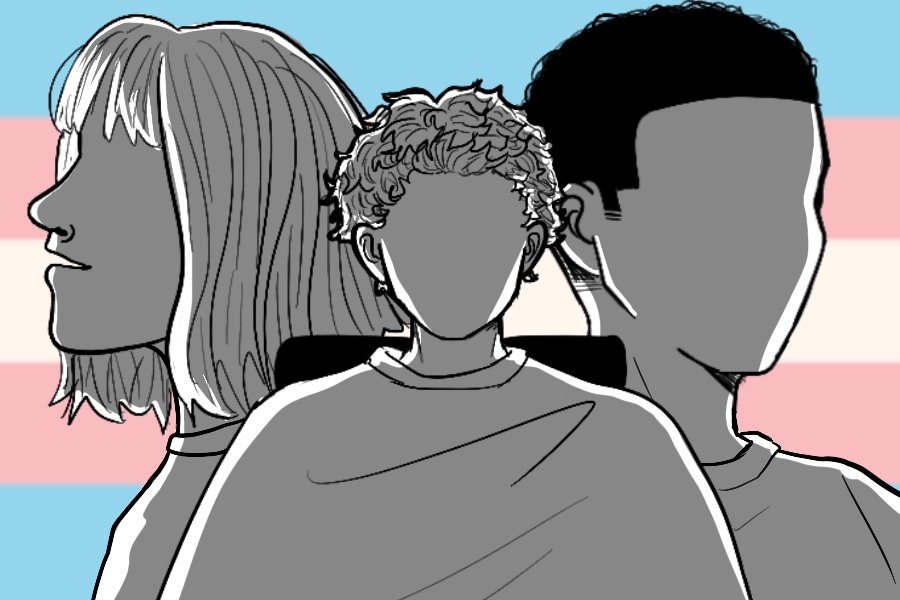Local hair salons work to become trans-welcoming spaces
Some Evanston hair salons have changed their policies and pricing to become more trans-inclusive.
January 30, 2022
Like many other hair salons, Aim & Ailie Hair Boutique on Central Street used to split its services into men’s and women’s haircuts.
But when the shop’s then-manager, SESP junior and lifelong Evanston resident Trin Collins, came out as nonbinary, the salon’s owners brought up the possibility of changing their pricing model. Together, they worked out a new gender-inclusive policy.
“We all met and had a more meaningful conversation about what does it mean to be trans inclusive, what does it mean to create a safe space,” Collins said. “Because if we were going to say, ‘Hey, we’re a safe space,’ I wanted to make sure that my community actually felt safe there.”
Hairstyles traditionally have gendered connotations. Even shop names traditionally denote a gendered space: barbershops for men and hair salons for women. In recent years, however, some Evanston hairstylists and other local shop owners have worked to make their shops more inclusive.
Aim Larrabee, one of the owners of Aim & Ailie’s, said the changes they made were prompted by a conversation with Collins.
“(Collins) didn’t know if we had done what we can to make it an inclusive space,” Larrabee said.
Larrabee said that was hard to hear, but Collins insisted on being heard. They worked together with other staff to change the salon’s policies. Larrabee said she had to override the default booking setting on the website, which was divided between men’s and women’s haircuts.
The salon also made other changes, like giving pronoun pins to staff and changing the bathroom sign to a gender-inclusive one. Afterwards, Collins said the environment at the salon improved.
“From folks working there to folks coming in, it just became queerer, which was really joyful,” they said.
Aim & Ailie’s isn’t the only hair salon in Evanston that’s shifted its business model. Claire Tourloukis, a hairstylist who runs Claire Does Hair at Salon Lofts, changed the gendered model of describing haircuts last December. She said she made the change after a nonbinary client asked her about advice on choosing a service.
“I thought … what am I waiting for?” Tourloukis said. “There’s no time like the present to change it.”
Strands for Trans, an initiative that aims to make salons and barbershops trans-inclusive, maintains a map of welcoming stores. Tourloukis added her salon to the map.
Tourloukis noted that hair can be a medium for exploring gender for some of her clients. One client in particular spoke with her about the ways she wanted to express herself through hair.
“She’s feeling a little bit more masculine, wants to kind of explore that side of herself,” Tourloukis said. “So she’s like, ‘I want to try blue.’ So I’m like, ‘Okay, let’s try blue.’ We took a bunch of lengths off and kind of gave her a shorter style.”
Jamie Black, who used to live in Evanston and now lives in Chicago, said Evanston feels like a generally accepting space to him as a trans man.
However, he said he doesn’t have to worry as much about being safe in businesses — at least on account of his gender — because he’s able to pass as cisgender. For him, being a Black man is a much more identifiable position.
“Nobody’s gonna go, ‘Oh, wait a second. That’s a trans man. I don’t want them in my business,’” he said. “I’m kind of in a position where I can be incognito.”
To Collins, Evanston businesses still have a ways to go to be completely trans-welcoming.
Supporting trans people shouldn’t be about making more money, they said. They pointed out Evanston doesn’t have a space that serves queer youth and offers gender-affirming clothes and haircuts. Collins called for businesses to step up and fill that gap.
“It’s not all about profit,” Collins said. “It’s about, we know that trans youth of color are grossly mistreated in our communities, and how can we go out of our way to serve them?”
Email: [email protected]
Twitter: @avivabechky
Related Stories:
— Northwestern scholars co-found Center for Applied Transgender Studies with institutions worldwide
— Kyle Lukoff reads his book on transgender identity to Evanston children


